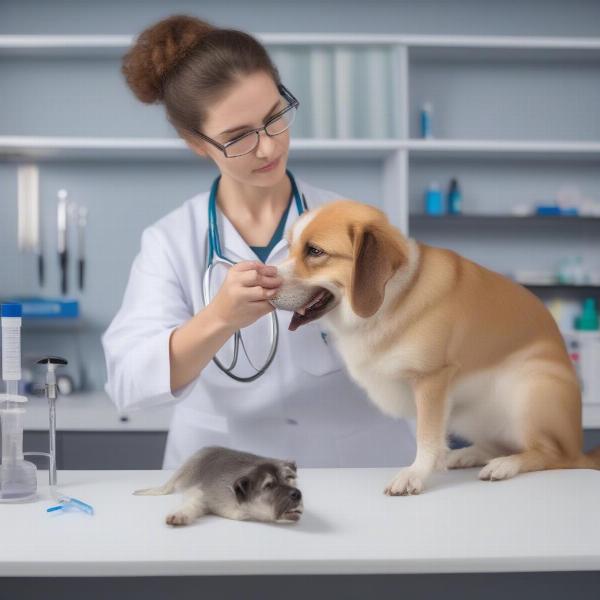Dog chewing his tail can be a common yet puzzling behavior. While a little nibbling might seem harmless, persistent tail chasing and chewing can indicate underlying issues ranging from simple boredom to more serious medical conditions. Understanding why your dog is engaging in this behavior is crucial to addressing it effectively and ensuring your furry friend’s well-being. This article will explore the various reasons why a dog might chew his tail and provide practical solutions to help you curb this potentially harmful habit.
Why is My Dog Chewing His Tail?
Several factors can contribute to a dog chewing his tail. Identifying the root cause is the first step towards resolving the issue.
Medical Reasons
- Allergies: Just like humans, dogs can suffer from allergies that cause itchy skin. If your dog has a food or environmental allergy, their tail might be a prime target for chewing due to inflammation and irritation.
- Parasites: Fleas, ticks, and mites can infest a dog’s tail, causing intense itching and prompting excessive chewing.
- Infections: Bacterial or fungal infections can affect the skin on the tail, leading to discomfort and chewing. Hot spots, characterized by moist, inflamed skin, are a common example.
- Anal Gland Issues: Impacted or infected anal glands can cause discomfort around the tail base, leading to chewing as the dog tries to alleviate the irritation.
- Injury: A cut, bruise, or other injury to the tail can trigger chewing.
Behavioral Reasons
- Boredom and Anxiety: Dogs left alone for extended periods or lacking sufficient mental and physical stimulation can develop anxiety and boredom, leading to compulsive behaviors like tail chasing and chewing.
- Stress: Changes in routine, new environments, or stressful events can trigger tail chewing as a coping mechanism.
- Compulsive Disorder: In some cases, tail chewing can become a compulsive disorder, similar to obsessive-compulsive disorder (OCD) in humans.
How to Stop a Dog from Chewing His Tail
Addressing tail chewing depends on the underlying cause. Here are some general solutions and strategies:
Veterinary Care
- Consult a Veterinarian: The first step is to rule out any medical reasons for the behavior. A veterinarian can diagnose allergies, infections, parasites, or other medical issues and recommend appropriate treatment.
- Medication: If allergies or infections are the culprits, your veterinarian may prescribe medication to alleviate the itching and inflammation.
Behavioral Management
- Increase Exercise and Enrichment: Provide your dog with plenty of physical exercise and mental stimulation to reduce boredom and anxiety. This includes daily walks, playtime, and interactive toys.
- Training and Behavior Modification: Work with a certified dog trainer to address any underlying anxiety or compulsive behaviors. They can teach you techniques to redirect your dog’s attention and manage their stress levels.
- Environmental Changes: Create a calm and predictable environment for your dog. Ensure they have a safe and comfortable space where they can relax and de-stress.
- Distraction Techniques: When you notice your dog starting to chew their tail, redirect their attention with a toy or a favorite activity.
 Veterinarian Examining Dog's Tail
Veterinarian Examining Dog's Tail
Home Remedies (with Veterinary Approval)
- Soothing Baths: Oatmeal baths can help soothe itchy skin caused by allergies or dry skin. However, consult your veterinarian before trying any home remedies.
- Dietary Changes: If food allergies are suspected, your veterinarian may recommend a hypoallergenic diet to eliminate potential triggers.
When to Seek Immediate Veterinary Attention
If your dog’s tail chewing is accompanied by any of the following signs, seek immediate veterinary attention:
- Broken skin or bleeding
- Excessive licking or chewing
- Signs of pain or discomfort
- Swelling or redness around the tail area
- Changes in appetite or behavior
Conclusion
Dog chewing his tail can be a symptom of various underlying issues, ranging from simple boredom to more serious medical conditions. By understanding the potential causes and implementing appropriate solutions, you can help your dog break this habit and live a happier, healthier life. Remember, a visit to the veterinarian is crucial to rule out any medical concerns and develop the best course of action for your furry friend.
FAQ
-
Q: Is tail chewing always a sign of a medical problem? A: No, tail chewing can also be caused by behavioral issues like boredom, anxiety, or stress.
-
Q: How can I tell if my dog’s tail chewing is serious? A: If the chewing is excessive, causing broken skin, bleeding, or other signs of distress, it’s essential to consult a veterinarian.
-
Q: Can I use human anti-itch creams on my dog’s tail? A: No, never use human medications on your dog without consulting a veterinarian.
-
Q: What kind of toys can help a bored dog? A: Puzzle toys, chew toys, and interactive toys can provide mental stimulation and prevent boredom.
-
Q: How much exercise does my dog need? A: The amount of exercise varies depending on the breed, age, and health of your dog. Consult your veterinarian for personalized recommendations.
-
Q: Can training help with compulsive tail chewing? A: Yes, a certified dog trainer can teach you techniques to redirect your dog’s attention and manage compulsive behaviors.
-
Q: What should I do if my dog’s tail is bleeding from chewing? A: Contact your veterinarian immediately for advice and treatment.
ILM Dog is a leading international dog care website dedicated to providing expert advice and resources for dog owners worldwide. We offer comprehensive information on dog breeds, health, training, nutrition, grooming, and much more. Whether you’re a new dog owner or a seasoned pro, ILM Dog is your go-to resource for all things dog-related. Contact us today for expert advice: Email: [email protected], Phone: +44 20-3965-8624. ILM Dog is committed to helping you provide the best possible care for your canine companion.